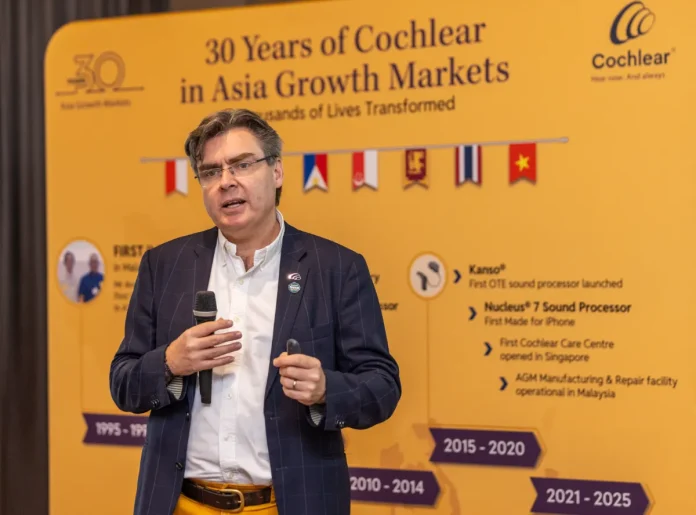KUALA LUMPUR: Cochlear Malaysia Sdn Bhd, a manufacturer of implantable hearing devices, is charting growth plans that extend over the next two to three decades, backed by sustained investments in research and development (R&D).
Firmly focused on the future, the Malaysian subsidiary of Australia-based Cochclear Ltd is emerging as an increasingly vital pillar of the group’s global operations, with the Malaysian operation now standing as its third-largest site worldwide.
This long-range outlook reflects Cochlear’s confidence in Malaysia’s role as a strengthening manufacturing hub, complementing its major operations in Australia, the United States and China.
As Cochlear deepens its presence in Kuala Lumpur, it signals the region’s rising significance in advancing innovation and supporting the next generation of implantable hearing technologies.
Cochlear president for Asia-Pacific and Latin America Stuart Sayers said the Malaysian government made the country an attractive place to establish operations back in the 1990s, and that support continues today.
“It is also incredibly central … I believe there are about 31 countries and 140 airports that you can reach by direct flight from Kuala Lumpur. That makes it an ideal distribution hub. For example, every single broken device from around the world is sent to Kuala Lumpur for repair.
“If we based that operation in Australia, every flight would be a long haul. Kuala Lumpur is much closer to the rest of the world, and that proximity makes a real difference,” Sayers told SunBiz.
He said Cochlear has 1,500 Malaysian recipients as clients, and it expects that number to continue rising.
“Historically, we’ve grown by about 10% to 20% each year, but we know we need to accelerate that pace because the demand is far greater.
“In Malaysia, the current priority remains children, but as the population ages – a trend already evident in markets like Korea, Japan, Australia, the United States, the United Kingdom, Italy, Spain and across Western Europe – the need among adults will expand rapidly.
“Once people reach 60, roughly a quarter experience moderate or more severe hearing loss, and that proportion increases significantly over time. Singapore reflects a similar pattern,” Sayers said.
Malaysia currently conducts about 100 cochlear implant procedures each year, a figure that meets less than 10% of the needs of the 1,500 children eligible for intervention. This gap is even wider when considering the many adults who would also benefit from cochlear implants.
“Given this, a growth rate of 10% to 20% annually is the minimum we are aiming for,” Sayers said.
Cochlear celebrated 30 years in Malaysia and Asean this year. The celebration underscores Cochlear’s long-term commitment to advancing hearing health and accessibility in Malaysia and Asean.
Since establishing its presence in Malaysia three dec
ades ago, Cochlear has played a pivotal role in supporting thousands of Malaysians and over 10,000 in the Asean region living with hearing loss, from children to adults.
In line with its 30-year presence, Cochlear launched the Cochlear Nucleus Nexa System – the smart cochlear implant system – in Malaysia.
The new implant features internal memory and upgradeable firmware, allowing recipients to access future innovation through firmware updates.
Cochlear’s total investment to date in Malaysia stands at RM50 million with an expanded global manufacturing facility in Kuala Lumpur, adding more than 500 new jobs and strengthening Malaysia’s role as one of the company’s key global operations.
The enlarged 50,000-square-foot site supports logistics, supply chain and IT functions, enabling production and distribution to more than 180 countries.
Operating on renewable energy, the facility also advances Cochlear’s commitment to reach net-zero carbon emissions by 2030, in line with Malaysia’s national sustainability goals.
Looking ahead, Sayers said, Cochlear expects its Malaysian operations to continue expanding steadily over the next three to five years.
The company approaches its global investments with a long-term horizon, ensuring that every major facility is built to support decades of growth. This commitment, he added, is reflected in the significant ramp-up of activity in Kuala Lumpur, particularly in manufacturing, repairs and R&D.
“Facilities like ours require substantial investment, so we plan with a very long horizon. In the next three to five years, we expect continued growth here – in the volume of devices manufactured and repaired, and in the scale of our overall activity.”
Cochlear now has nearly 100 R&D specialists based in Malaysia, a sharp increase from fewer than 30 just three years ago. In total, the company employs around 500 people locally, including more than 300 in manufacturing and the remainder in shared services such as IT and quality assurance.
Malaysia’s strong pipeline of highly skilled talent – across engineering, manufacturing, R&D and digital functions – continues to reinforce the country’s strategic importance within Cochlear’s global footprint.
“In Southeast Asia, we have steadily strengthened our direct presence. In Thailand, we have already transitioned to a fully direct model, and in Malaysia, we have moved from relying on a distributor to establishing our own local team.
“This allows us to expand our coverage across the entire country – not just in major metropolitan areas, but also in second-tier cities and across East Malaysia. It is part of our ongoing effort to build a deeper, more consistent presence throughout the region,” Sayers said.







